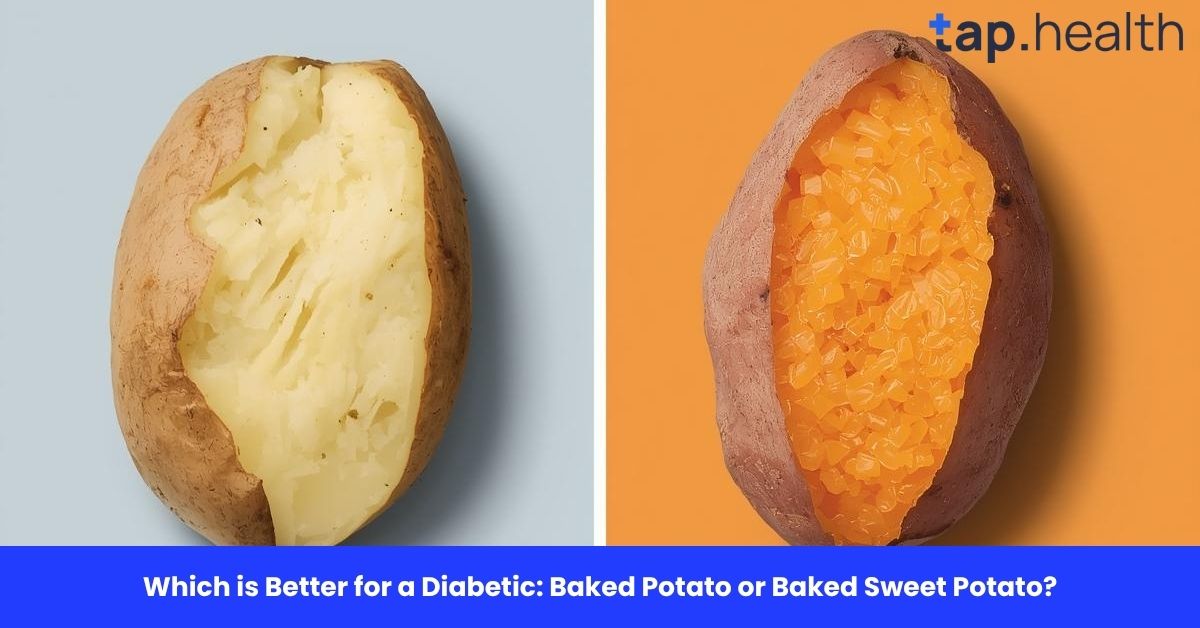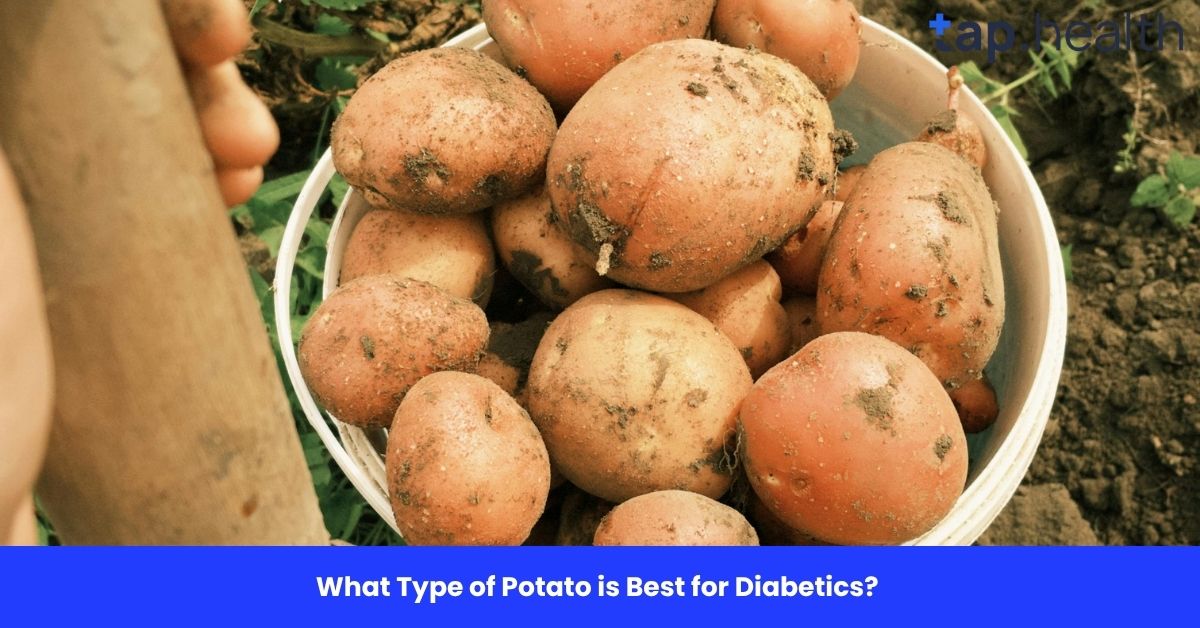Diabetes is a condition that requires careful attention to diet and lifestyle. People with diabetes must be cautious about what they eat, especially foods that impact blood sugar levels. When it comes to side dishes, baked potatoes and baked sweet potatoes are both popular choices. But which is better for a diabetic?
In this article, we’ll dive into the differences between baked potatoes and baked sweet potatoes, compare their nutritional value, and see how they affect blood sugar levels. We will also answer common questions to help you make an informed decision about which potato is a healthier option for diabetics.
The Basics: What is Diabetes and Why Food Choices Matter
Diabetes is a condition where the body cannot properly regulate blood sugar (glucose) levels. There are two main types:
- Type 1 diabetes: The body doesn’t produce insulin, a hormone that helps regulate blood sugar.
- Type 2 diabetes: The body becomes resistant to insulin or doesn’t produce enough.
Food choices are crucial for diabetics because certain foods can cause blood sugar spikes. Managing your blood sugar levels can help prevent complications and maintain a good quality of life.
Baked Potato vs. Baked Sweet Potato: Key Differences
Before we dive into the specifics of how each affects diabetes, let’s first take a look at the key differences between a baked potato and a baked sweet potato.
Baked Potato
A baked potato is a type of starchy vegetable that belongs to the nightshade family. It’s a popular comfort food but has a higher glycemic index (GI), which means it can raise blood sugar levels more quickly than some other foods. Common types of baked potatoes include russet and red potatoes.
- Nutritional content: A medium-sized baked potato (around 150 grams) typically contains about 130 calories, 37 grams of carbs, 3 grams of fiber, and 3 grams of protein.
- Glycemic Index: The GI of a baked potato ranges between 85 and 111, depending on the variety. A higher GI means faster digestion and a rapid rise in blood sugar.
Baked Sweet Potato
A baked sweet potato is a root vegetable, also known for its natural sweetness. Unlike regular potatoes, sweet potatoes have a lower GI, which makes them a better option for blood sugar control.
- Nutritional content: A medium-sized baked sweet potato (around 130 grams) typically contains about 112 calories, 26 grams of carbs, 4 grams of fiber, and 2 grams of protein.
- Glycemic Index: The GI of a baked sweet potato is lower, generally ranging between 44 and 61, making it a more diabetic-friendly choice.
Glycemic Index: The Key Factor for Diabetics
When choosing foods for a diabetic diet, the glycemic index (GI) is one of the most important factors to consider. The GI measures how quickly a food raises blood sugar levels after consumption. Foods are ranked on a scale of 0 to 100:
- Low GI foods: 55 or less
- Medium GI foods: 56 to 69
- High GI foods: 70 or higher
Why Does GI Matter?
A high GI food, like a baked potato, causes blood sugar levels to rise quickly. This can be harmful to diabetics, as it puts strain on the insulin-producing cells in the body. Foods with a lower GI, like baked sweet potatoes, are digested more slowly, leading to a more gradual rise in blood sugar levels.
Nutritional Comparison: Baked Potato vs. Baked Sweet Potato
Now, let’s compare the nutritional benefits of both baked potatoes and baked sweet potatoes for diabetics.
Carbohydrates and Fiber
Carbohydrates are the primary source of energy for the body, but they also have the biggest impact on blood sugar levels. Both baked potatoes and sweet potatoes are rich in carbohydrates, but sweet potatoes have an advantage due to their higher fiber content.
- Baked Potato: 37 grams of carbs and 3 grams of fiber.
- Baked Sweet Potato: 26 grams of carbs and 4 grams of fiber.
The higher fiber content in sweet potatoes helps slow the absorption of sugar into the bloodstream, preventing sudden spikes in blood sugar.
Micronutrients: Vitamins and Minerals
- Baked Potato: A baked potato is a good source of Vitamin C, potassium, and B vitamins.
- Baked Sweet Potato: Sweet potatoes are packed with Vitamin A (as beta-carotene), Vitamin C, and also contain potassium and manganese.
Sweet potatoes stand out for their high beta-carotene content, which is beneficial for eye health, immune function, and skin health.
Impact on Blood Sugar: Which is Better for Diabetics?
When it comes to managing blood sugar levels, baked sweet potatoes are a better option for most diabetics than baked potatoes. This is primarily due to their lower glycemic index, which means they cause a slower and more controlled rise in blood sugar levels.
- Baked Potato: Due to its high GI, a baked potato can cause a rapid spike in blood sugar. This can be problematic for people with diabetes, especially those trying to maintain steady blood sugar levels.
- Baked Sweet Potato: With its lower GI, a baked sweet potato is digested more slowly, making it a better choice for blood sugar control. Additionally, the fiber content in sweet potatoes helps regulate blood sugar levels.
However, portion size is also important. A large serving of baked potato could have more carbs and cause a higher rise in blood sugar, even though it is a high-GI food.
Are There Any Health Benefits to Both?
While sweet potatoes are generally better for managing blood sugar, both baked potatoes and baked sweet potatoes have health benefits when consumed in moderation.
Health Benefits of Baked Potatoes
- Rich in potassium: Potassium helps regulate blood pressure and is essential for proper muscle and nerve function.
- Good source of Vitamin C: Potatoes can boost immune function and help with wound healing.
- Contains antioxidants: Potatoes have certain antioxidants that help fight inflammation.
Health Benefits of Baked Sweet Potatoes
- Rich in Vitamin A: Sweet potatoes are high in beta-carotene, which helps with vision, immune function, and skin health.
- Anti-inflammatory: Sweet potatoes are rich in antioxidants that can reduce inflammation.
- Promotes digestive health: The fiber in sweet potatoes aids digestion and supports gut health.
Which is Better for Diabetics in the Long Run?
In the long run, baked sweet potatoes are the healthier option for diabetics, due to their lower glycemic index, higher fiber content, and rich array of vitamins and antioxidants. They can help manage blood sugar levels more effectively, while still providing essential nutrients for overall health.
Baked potatoes, while not inherently bad, are not as friendly to blood sugar management and should be consumed in moderation by diabetics.
Read this : How Many Calories Are in a Baked Potato?
Frequently Asked Questions (FAQs) on Which is Better for a Diabetic: Baked Potato or Baked Sweet Potato?
Can Diabetics Eat Baked Potatoes?
Yes, diabetics can eat baked potatoes, but they should be mindful of portion sizes. Since baked potatoes have a high glycemic index, they can cause rapid spikes in blood sugar. It’s best to pair them with other foods that are high in fiber and protein to balance the meal.
How Much Sweet Potato Can a Diabetic Eat?
A diabetic can safely consume about 1/2 to 1 medium-sized baked sweet potato per meal, depending on their individual carbohydrate needs and blood sugar goals. It’s important to monitor blood sugar levels after consumption to understand how it affects you.
Are Sweet Potatoes Better for Blood Sugar?
Yes, sweet potatoes are generally better for blood sugar control than regular potatoes because of their lower glycemic index. They also have more fiber, which helps prevent blood sugar spikes.
Can I Eat Sweet Potatoes Every Day as a Diabetic?
Yes, you can eat sweet potatoes every day, as long as you stick to moderate portions. Since sweet potatoes have a lower glycemic index and are packed with nutrients, they can be a healthy and diabetes-friendly option when consumed in moderation.
What Can I Add to a Baked Potato or Sweet Potato for Better Blood Sugar Control?
For better blood sugar control, consider adding healthy fats, protein, or a fiber-rich vegetable. For example, you can top your baked potato or sweet potato with Greek yogurt, olive oil, or a handful of leafy greens. This will help slow down the digestion and absorption of carbohydrates, keeping blood sugar levels steady.
Conclusion
In the debate of baked potato vs. baked sweet potato for diabetics, the sweet potato comes out on top. It offers more nutritional benefits, a lower glycemic index, and better overall control over blood sugar levels. However, both can be included in a diabetic diet in moderation. It’s essential to pay attention to portion sizes and pair them with other nutrient-dense foods for the best results.
Making the right food choices can help manage diabetes effectively, and understanding the glycemic index and nutritional content of different foods is key. So, next time you’re deciding between baked potatoes and sweet potatoes, opt for the latter for a healthier, diabetes-friendly option.


